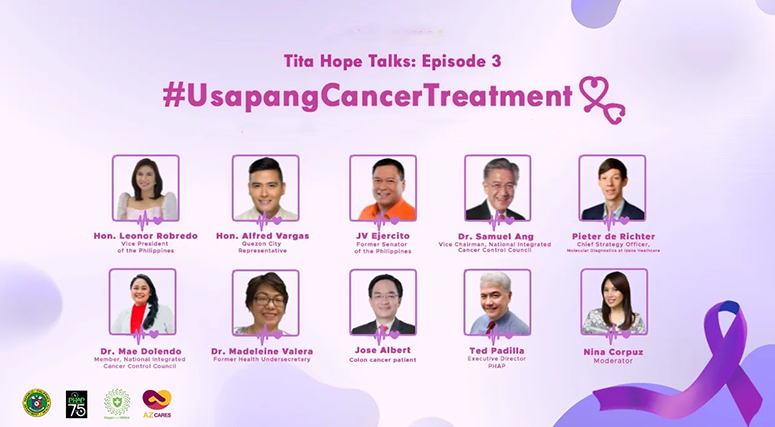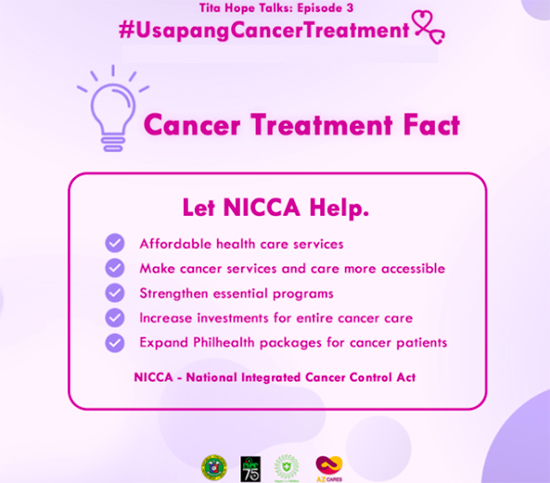#UsapangCancerTreatment: Putting cancer care on the national agenda
The coronavirus pandemic has compounded the problem of cancer care in the country.
While the country hasn’t flattened the curve yet, cancer cases continue to rise and access to cancer treatment also remains to be a problem.
“Aside from the physical and psychological burden, the financial costs for cancer treatment can be quite overwhelming,” shares cancer survivor Jose Albert, who was diagnosed with stage 2 colon cancer 23 years ago. “Unfortunately, not all cancer patients have access to information and innovative cancer treatments.”
Cancer game plan
Cancer is the third leading cause of death in the Philippines.
The alarming statistics raised concerns around the country’s cancer care and control program, which prompted the government’s issuance of the implementing rules and regulations of the National Integrated Cancer Control Act (NICCA) in 2019 to help create statutory requirements to address and prioritize gaps in the current continuum of cancer care.

The passage of the NICCA guarantees that all cancer survivors may have a chance to live more hopeful tomorrows.
“We predict that in 10 years, cancer may be our number one killer," said Dr. Samuel Ang, vice chairman of the National Integrated Cancer Control (NICC) Council. "But because of the NICCA law, there is a ray of hope in the Philippines. NICCA provides the means for funding.”
It is in this light that the Department of Health, the Pharmaceutical and Healthcare Association of the Philippines (PHAP), MSD in the Philippines’ Hope from Within, and AstraZeneca’s AZ Cares gathered national leaders, health experts, and patients to discuss the national agenda on healthcare and cancer treatment access in #UsapangCancerTreatment, the third episode of the “Tita Hope Talks” cancer conversation series.
Making healthcare a national priority
In her message, Vice President Leni Robredo said, “With the passage of the Universal Healthcare Act, it is our job to ensure that we effectively carry out these health reforms: enact policies that will push the universal healthcare agenda forward; strengthening health care regulations; and creating safeguards so that healthcare systems in local governments are integrated with their provincial counterparts; and to ensure that the system is fully funded by strengthening the collaboration between the private and public sector.”
Senator Panfilo Lacson, on the other hand, discussed the effects of the pandemic to cancer patients.
“The limitations brought about by this health crisis have also led to reduced diagnosis and treatment of other serious illnesses, including cancer,” he said.
QC Representative Alfred Vargas recalled efforts done to fund the country’s cancer program.
“We successfully included P620 million as cancer assistance fund into an overall P756 million for the cancer supportive care and palliative care access program in the 2021 national budget. This year, P786 million has been allocated in the national expenditure program which will lay the foundations for the 2022 national budget,” Vargas said.
Former Senator JV Ejercito, who became instrumental in the passage of the law, urged fellow legislators to ensure the implementation of the landmark cancer care law.
What’s next for NICCA?
Key provisions under NICCA include the creation of the Philippine Cancer Center to promote and encourage cancer research, provide training to medical professionals, and house the population-based cancer registry.

It also mandated the creation of a Cancer Assistance Fund and the National Integrated Cancer Control Council. NICCA also states that PhilHealth will expand its benefit packages to include primary care screening, detection, diagnosis, treatment assistance, supportive care, survivorship follow-up care, rehabilitation, and end-of-life care for all types and stages of cancer in both adults and children.
“I envision the NICCA to provide the framework for future cancer centers in both public and private sectors. An area within the Lung Center of the Philippines has been identified as the site for the Philippine Cancer Center,” said Dr. Samuel Ang.
The Department of Health (DOH) has also designated cancer specialty hospitals around the country.
“Through the cancer assistance fund, we have support for diagnostics, budget cancer medicines, supportive and pallative medicine access program,” added Dr. Mae Dolendo, a member of the NICCA Council.
Innovative cancer treatment options
A comprehensive cancer care law provides more innovative treatment options for patients.
“In the fight against cancer, the value of innovation has never been more emphasized,” said Dr. Teodoro Padilla, executive director of PHAP. “We have entered an era of new medicines where we are pushing science to have a meaningful impact on patients.”
#UsapangAccessSaCancerTreatment is co-presented by the Department of Health, PHAP, AstraZeneca (AZ Cares) and MSD’s Hope From Within, in collaboration with PSMO, PCS-Can Com and Hi-Precision.
* * *
Editor’s Note: This article was provided by MSD’s Hope From Within.



